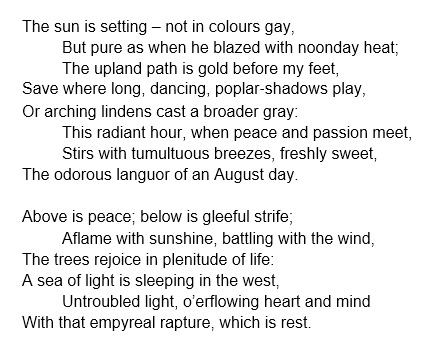‘Sunset’ is Naden’s August poem, a month that often signals the end of summer, and yet the approaching autumn is not brought into focus. Unlike many of Naden’s sonnets, in which she sees death and decay in the midst of burgeoning life, here even the setting of the sun is not paired with impending darkness. Instead the sun maintains its splendour, and while it has lost its ‘noonday heat’ the brightness remains, giving off the ‘pure’ white light of hot summer days. Even the shadows cast by the trees are playful and the ‘broader gray’ has no negative connotations of darkness, due in part to the rhyme scheme’s linking of it to ‘gay’ and ‘play’.
This is therefore a joyous poem, which when read on an inclement August day makes one yearn for bright sun and long evenings spend outdoors. The lull between day and night is captured in the line ‘This radiant hour, when peace and passion meet’, and encourages the reader to see sunset as facilitating and embodying the unification of distinct concepts. Naden’s desire to draw opposites together and bring them into harmony continues past the volta, as ‘peace’ and ‘strife’, and ‘heart and mind’ are brought into communion with each other.
Light undoubtedly suffuses the whole poem, which culminates in Naden’s repetition of the word in the two penultimate lines. Bright light envelopes us, and Naden uses the liquid imagery of ‘sea of light’ and ‘o’erflowing’ to express the way in which the sunset bathes the land and poet herself, who is a strong presence in this poem as the third line describes how sunlight guides both her physical and metrical feet.
Naden leaves space for a religious interpretation of this light,as it streams from an empyreal, peaceful sky that evokes restful rapture. However, while she plays on Christian descriptors of heaven here, she resists fully articulating these tropes and as a result indicates how her pantheistic appreciation of the natural world’s beauty is an equally acceptable way to understand and engage with the universe.


